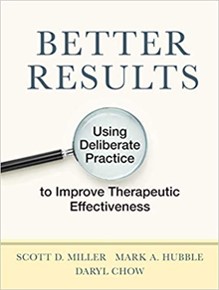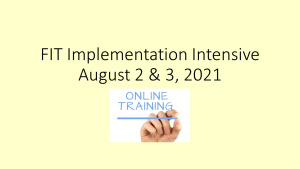 Deliberate Practice is hot. Judging from the rising number of research studies, workshops, and social media posts, it hard to believe the term did not appear in the psychotherapy literature until 2007.
Deliberate Practice is hot. Judging from the rising number of research studies, workshops, and social media posts, it hard to believe the term did not appear in the psychotherapy literature until 2007.
The interest is understandable. Among the various approaches to professional development — supervision, continuing education, personal therapy — the evidence shows deliberate practice is the only one to result in improved effectiveness at the individual therapist level.
Devoting time to rehearsing what one wants to improve is hardly a novel idea. Any parent knows it to be true and has said as much to their kids. Truth is, references to enhancing one’s skills and abilities through focused effort date back more than two millennia. And here is where confusion and misunderstanding begin.
- Clinical practice is not deliberate practice. If doing therapy with clients on a daily basis were the same as engaging in deliberate practice, therapists would improve in effectiveness over the course of their careers. Research shows they do not. Instead, confidence improves. Let that sink in. Outcomes remain flat but confidence in our abilities continuously increases. It’s a phenomenon researchers term “automaticity” — the feeling most of us associate with having “learned” to do something –where actions are carried out without much conscious effort. One could go so far as to say clinical practice is incompatible with deliberate practice, as the latter, to be effective, must force us to question what we do without thinking.
- Deliberate practice is not a special set of techniques. The field of psychotherapy has a long history of selling formulaic approaches. Gift-wrapped in books, manuals, workshops, and webinars, the promise is do this — whatever the “this” is — and you will be more effective. Decades of research has shown these claims to be empty. By contrast, deliberate practice is not a formula to be followed, but a form. As such, the particulars will vary from person to person depending on what each needs to learn. Bottom line: beware pre-packaged content.
- Applying deliberate practice to mastering specific treatment models or techniques. Consider a recent study out of the United Kingdom (1). There, like elsewhere, massive amounts of money have been spent training clinicians to use cognitive behavioral therapy (CBT). The expenditure is part of a well-intentioned government program aimed at improving access to effective mental health services (2). Anyway, in the study, clinicians participated in a high intensity course that included more than 300 hours of training, supervision, and practice. Competence in delivering CBT was assessed at regular intervals and shown to improve significantly throughout the training. That said, despite the time, money, and resources devoted to mastering the approach, clinician effectiveness did not improve. Why? Contrary to common belief, competence in delivering specific treatment protocols contributes a negligible amount to the outcome of psychotherapy. As common sensical as it likely sounds, to have an impact, whatever we practice must target factors have leverage on outcome.
My colleague, Daryl Chow and I, have developed a tool for helping practitioners develop an effective deliberate practice plan.  Known as the “Taxonomy of Deliberate Practice Activities” (TDPA), it helps you identify aspects of your clinical performance likely to have the most impact on improving your effectiveness. Step-by-step instructions walk you through the process of assessing your work, setting small individualized learning objectives, developing practice activities, and monitoring your progress. As coaching is central to effective deliberate practice, a version of the tool is available for your supervisor or coach to complete. Did I mention, its free? Click here to download the TDPA contained in the same packet as the Outcome and Session Rating Scales. While your are at it, join our private, online discussion group where hundreds of clinicians around the world meet, support one another, and share experiences and ideas.
Known as the “Taxonomy of Deliberate Practice Activities” (TDPA), it helps you identify aspects of your clinical performance likely to have the most impact on improving your effectiveness. Step-by-step instructions walk you through the process of assessing your work, setting small individualized learning objectives, developing practice activities, and monitoring your progress. As coaching is central to effective deliberate practice, a version of the tool is available for your supervisor or coach to complete. Did I mention, its free? Click here to download the TDPA contained in the same packet as the Outcome and Session Rating Scales. While your are at it, join our private, online discussion group where hundreds of clinicians around the world meet, support one another, and share experiences and ideas.
OK, that’s it for now. All the best,
Scott
Scott D. Miller, Ph.D.
Director, International Center for Clinical Excellence


P.S.: Improve your ability to deliver effective presentations online or in-person at the upcoming “Training of Trainers” workshop. This event is held only once, every two years — this time, online!

Leave a Reply